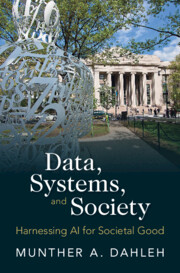Refine search
Actions for selected content:
1835 results in Knowledge Management, Databases and Data Mining
CHAPTER 6 - Pulling the Threads Together
-
- Book:
- The AI and Data Revolution
- Published by:
- Facet
- Published online:
- 20 August 2025
- Print publication:
- 24 April 2025, pp 135-136
-
- Chapter
- Export citation
Frontmatter
-
- Book:
- The AI and Data Revolution
- Published by:
- Facet
- Published online:
- 20 August 2025
- Print publication:
- 24 April 2025, pp i-vi
-
- Chapter
- Export citation
Copyright page
-
- Book:
- Data, Systems, and Society
- Published online:
- 24 March 2025
- Print publication:
- 27 March 2025, pp iv-iv
-
- Chapter
- Export citation
8 - Personal Reflections on the Journey
-
- Book:
- Data, Systems, and Society
- Published online:
- 24 March 2025
- Print publication:
- 27 March 2025, pp 119-126
-
- Chapter
- Export citation
Index
-
- Book:
- Data, Systems, and Society
- Published online:
- 24 March 2025
- Print publication:
- 27 March 2025, pp 141-144
-
- Chapter
- Export citation
Bibliography
-
- Book:
- Data, Systems, and Society
- Published online:
- 24 March 2025
- Print publication:
- 27 March 2025, pp 137-140
-
- Chapter
- Export citation
3 - Who – and What – Should Drive Decision-Making?
-
- Book:
- Data, Systems, and Society
- Published online:
- 24 March 2025
- Print publication:
- 27 March 2025, pp 41-56
-
- Chapter
- Export citation
Reviews
-
- Book:
- Data, Systems, and Society
- Published online:
- 24 March 2025
- Print publication:
- 27 March 2025, pp ii-ii
-
- Chapter
- Export citation
1 - The Pitfalls, Promises, and Challenges of Data
-
- Book:
- Data, Systems, and Society
- Published online:
- 24 March 2025
- Print publication:
- 27 March 2025, pp 1-18
-
- Chapter
- Export citation
2 - A Confluence of Fields
-
- Book:
- Data, Systems, and Society
- Published online:
- 24 March 2025
- Print publication:
- 27 March 2025, pp 19-40
-
- Chapter
- Export citation
4 - A Transdiscipline Is Born
-
- Book:
- Data, Systems, and Society
- Published online:
- 24 March 2025
- Print publication:
- 27 March 2025, pp 57-72
-
- Chapter
- Export citation
Acknowledgments
-
- Book:
- Data, Systems, and Society
- Published online:
- 24 March 2025
- Print publication:
- 27 March 2025, pp 127-136
-
- Chapter
- Export citation
7 - People, Programs, and Research
-
- Book:
- Data, Systems, and Society
- Published online:
- 24 March 2025
- Print publication:
- 27 March 2025, pp 111-118
-
- Chapter
- Export citation
Contents
-
- Book:
- Data, Systems, and Society
- Published online:
- 24 March 2025
- Print publication:
- 27 March 2025, pp v-viii
-
- Chapter
- Export citation
Preface
-
- Book:
- Data, Systems, and Society
- Published online:
- 24 March 2025
- Print publication:
- 27 March 2025, pp ix-xii
-
- Chapter
- Export citation
5 - Complexity versus Relevance
-
- Book:
- Data, Systems, and Society
- Published online:
- 24 March 2025
- Print publication:
- 27 March 2025, pp 73-88
-
- Chapter
- Export citation
6 - The Care and Feeding of a New Discipline at MIT
-
- Book:
- Data, Systems, and Society
- Published online:
- 24 March 2025
- Print publication:
- 27 March 2025, pp 89-110
-
- Chapter
- Export citation

Data, Systems, and Society
- Harnessing AI for Societal Good
-
- Published online:
- 24 March 2025
- Print publication:
- 27 March 2025

The Value of Industrial Relations
- Contemporary Work and Employment in Britain
-
- Published by:
- Bristol University Press
- Published online:
- 07 January 2025
- Print publication:
- 15 January 2024

Crises at Work
- Economy, Climate and Pandemic
-
- Published by:
- Bristol University Press
- Published online:
- 27 December 2024
- Print publication:
- 06 September 2024
